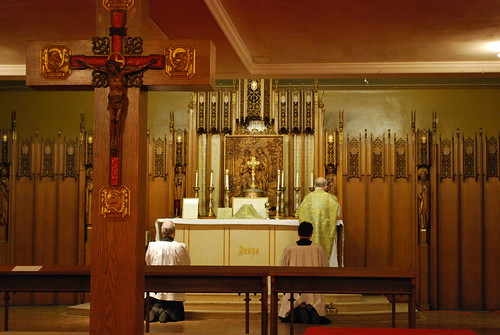Went to my suburban parish today for  a Saturday 4 pm Mass. They had a pretty competent organist at the console today, which you can’t usually count on at this church, so it was a good start.
a Saturday 4 pm Mass. They had a pretty competent organist at the console today, which you can’t usually count on at this church, so it was a good start.
Entrance Hymn: These Forty Days of Lent
Kyrie: plainchant from the Missa Primitiva
These first two pieces were a good start too. Have I been too critical of the parish’s music? Are things actually improving? Maybe I should be willing to volunteer here.
Responsorial Psalm setting: Psalm 23, some contemporary setting in 3/4 time.
It didn’t sound bad, but the composer took liberties with the text: “You give me the courage I need”. What? I wish they wouldn’t do that.
Today was Appeal Sunday, so some teens who didn’t know how to genuflect came into the sanctuary and maneuvered a projection screen in front of the tabernacle. We saw a video by the Cardinal. It contained a good homily, so I forgave the intrusion of technology. Then the teens put the screen aside again.
Things went downhill from there:
Offertory: Precious Lord, Take My Hand
It’s a classic black gospel song written by the great Thomas Dorsey (see the documentary Say Amen, Somebody), but was it suitable for Mass? Nope, nope, nope: (1) it’s a syncopated text setting, and that’s enough to rule it out: an above-average choir can sing something this rhythmically irregular, but congregations can’t, especially with the loose tempo they used; (2) the text is soloistic: all about the Lord Jesus and Me; (3) it’s a black gospel song, sung in a practically all-white suburb, which is pretentious. For probably all of those reasons, nobody in the congregation sang along.
Then things got better again:
Holy: something reasonably good and singable: it sounded like Proulx
Amen: a matching piece
Agnus Dei: plainchant from the Missa Primitiva
And then we went back to Protestant sentimentality:
Communion: Softly and Tenderly, Jesus Is Calling
You know the one I mean? “Earnestly, tenderly, Jesus is calling, calling for you and for me” — this time they decided to dip into the Baptist playbook and pull out this 1880 piece; another dramatic solo number, a little more bathetic than the previous one. Too bad the missalette publisher didn’t respect the song’s integrity, and took out the pointed expression: “O sinner, come home”. Blah.
Second communion piece: The Old Rugged Cross (organ instrumental)
What’s the deal here? Do these musicians think they’re improving the Mass by pulling out this 1913 number? A lot of Catholic hymns from the period were kitschy music that doesn’t belong in Mass, and — guess what? — so are a lot of the Protestant ones!
If the musicians in this parish wanted to bring in some Protestant music as an attempt at “inclusivity” or “inculturation”, they should have noticed that we here in New England are not surrounded by revivalist tabernacles or black churches, so those songs don’t reflect the local culture. They’re a cultural pose. In contrast, New England has lots of congregations where you’ll find Congregationalists, Methodists, and Episcopalians, and if only we’d stick to stealing their hymns, we’d have something much more singable!
Finally, as a relief, the music switched back to a perfectly acceptable hymn:
Recessional hymn: Lift High The Cross
The parish music is suffering from Multiple Personality Disorder.


 a Saturday 4 pm Mass. They had a pretty competent organist at the console today, which you can’t usually count on at this church, so it was a good start.
a Saturday 4 pm Mass. They had a pretty competent organist at the console today, which you can’t usually count on at this church, so it was a good start.